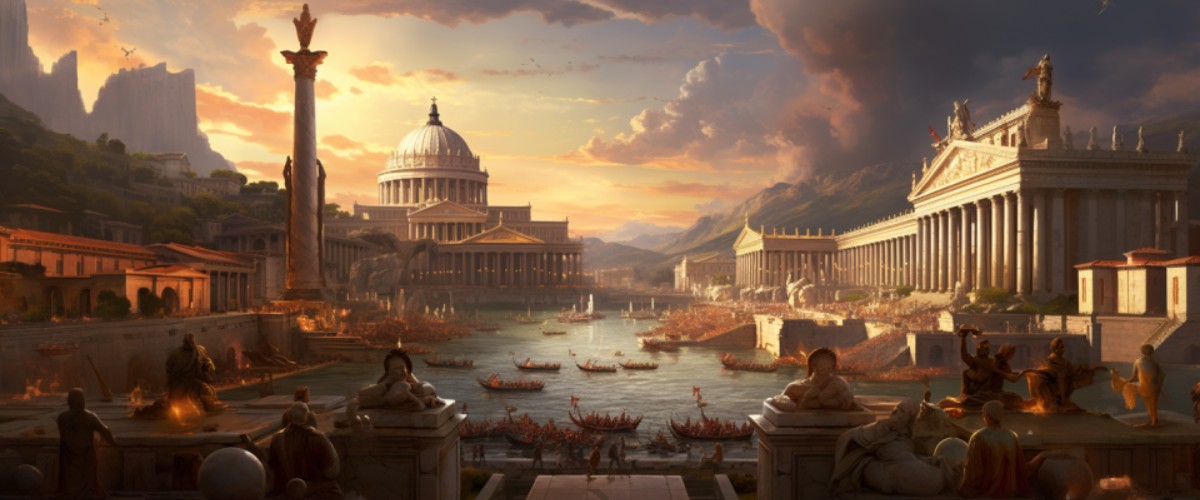The Roman Empire, a colossal entity that once sprawled across three continents, left an indelible mark on the pages of history, crafting a legacy that reverberates across time and space.
Background: Setting the Imperial Stage
The Rise of an Empire
- Transition from Republic: A cascade of social and political crises gradually eroded the foundations of the Roman Republic, paving the way for Augustus and imperial rule.
- Augustus’s Ascent: In 27 BCE, Augustus (formerly Octavian) heralded the dawn of the Roman Empire, transforming Rome from republic to autocratic empire.
Key Figures
- Augustus: The inaugural emperor, whose policies and governance moulded the empire’s initial path.
- Julius Caesar: His contentious role in the republic and subsequent assassination was a catalyst for the onset of the empire.
- Other Emperors: Notables like Nero, Trajan, and Constantine, each of whom imprinted their legacy on the empire.
Major Happenings: Defining Moments of an Empire
- Establishment of the Pax Romana
- A period of relative peace and stability that enveloped the empire for over two centuries.
- Construction Marvels
- The engineering feats of Romans, epitomised by structures like the Colosseum and aqueducts, showcased their architectural prowess.
- Spread of Christianity
- Christianity transitioned from a persecuted religion to the empire’s official faith under Emperor Constantine.
- Barbarian Invasions
- Waves of invasions from Goths, Vandals, and other tribes tested and eventually toppled the empire’s western half.
Immediate Outcomes: The Imprint of Collapse
Societal and Political Shifts
- Fragmentation: The fall of Rome fragmented the Western Mediterranean into smaller, successor kingdoms.
- Economic Disruption: Trade and urban life declined dramatically in the west, signalling the onset of the European Dark Ages.
Cultural Consequences
- Christianity’s Ascent: The religion further entrenched itself, with the Papacy in Rome becoming a pivotal Christian institution.
- Preservation of Knowledge: Some aspects of Roman knowledge and governance were preserved, especially by the Byzantine Empire.
Long-term Impact: Echoes of the Empire
Cultural and Technological Legacies
- Architectural Influences: Roman engineering and design continue to inspire modern architecture.
- Legal Framework: Roman law has informed numerous modern legal systems, entrenching ideas of justice and citizenship.
Political and Societal Ramifications
- Language Development: Romance languages (e.g., Italian, Spanish, French) evolved from Latin, the lingua franca of the Roman Empire.
- City-Planning: Principles of Roman urban planning reverberate in the layout of modern cities worldwide.
Conclusion: The Enduring Essence of Rome
The Roman Empire, despite its eventual fragmentation, has woven its legacy through the tapestry of centuries, embedding its cultural, technological, and philosophical marvels into subsequent civilizations.
A Beacon of Antiquity
- Teaching Future Generations: Rome’s experiences, from triumphs to downfalls, educate about governance, society, and humanity.
- Imperishable Influence: Rome’s multifaceted impacts continue to permeate various aspects of modern society, from our governance to our cities.
The Timeless Metaphor
- The empire serves as both a metaphor and a cautionary tale, illustrating the transitory nature of power and the immortal potential of cultural and technological advancements.
In a world where the echoes of the past perennially whisper into the winds of the present, the Roman Empire stands eternal, a testament to humanity’s imperishable desire to carve significance into the stone of history.








